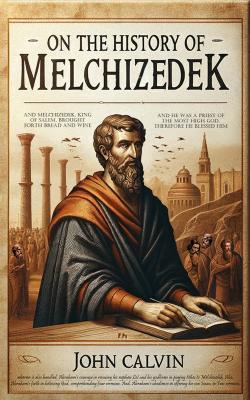wherein is also handled, Abraham's courage in rescuing his nephew Lot and his godliness in paying tithes to Melchizedek. Also, Abraham's faith in believing God, comprehending four sermons. And, Abraham's obedience in offering his son Isaac; in two sermons.
Translated out of French by Thomas Stocker, Gent.
John Calvin's "On the History of Melchizedek" explores the biblical account of Melchizedek, offering theological insights into his character and significance. Calvin explores Melchizedek's role as a figure (or type) of Christ, highlighting his priesthood and kingship as prefigurations of Christ's eternal priesthood. Through detailed exegesis, Calvin unpacks the implications of Melchizedek's interaction with Abraham, emphasizing the theological and spiritual lessons relevant to Christian faith and practice. This work serves as a bridge between Old Testament figures and New Testament fulfillment in Christ, underscoring Calvin's exegetical skill and deep theological understanding.
Calvin articulates how Melchizedek, as both king and priest, prefigures the dual roles of Jesus Christ, emphasizing the unique position of Melchizedek in the biblical narrative as being without genealogy, which serves to underscore the eternal priesthood of Christ. This typology is crucial for Calvin's theological framework, highlighting the continuity between the Old Testament figures and the fulfillment they find in New Testament revelation. Melchizedek's interaction with Abraham, particularly the blessing and the receiving of tithes, is interpreted as symbolizing the superiority of Christ's priesthood over the Levitical priesthood, and thus, Melchizedek's priesthood becomes a prophetic foreshadowing of the eternal priesthood of Christ.
Calvin deeply explores the theological significance of Melchizedek’s priesthood and kingship as direct figures of Christ's own ministry, emphasizing that Melchizedek's appearance in Genesis is not just a historical account but a divine appointment that reveals significant truths about the nature of Christ's work of salvation. Melchizedek's blessing of Abraham is particularly poignant, illustrating the greater reality that Christ, the true High Priest, blesses humanity with salvation and reconciliation to God. Calvin uses this typology to argue for the centrality of Christ in all of Scripture, asserting that understanding Melchizedek's role is key to grasping the comprehensive scope of God's redemptive plan as revealed through biblical history.
Moreover, Calvin's interpretation serves as a bridge between the testaments, showcasing his exegetical skill in drawing out Christological meanings from Old Testament figures. This approach not only enriches the reader's understanding of Scripture but also reinforces the Reformed emphasis on Christ as the culmination of God's revelation. For Calvin, Melchizedek is more than a historical figure; he is a theological symbol that points to Christ's surpassing priesthood and kingship, reinforcing the doctrine of salvation by grace through faith in Christ alone. Calvin's work on Melchizedek thus stands as a testament to his deep commitment to uncovering the Christ-centered unity of the Bible, offering profound insights into the character and work of Jesus Christ as foreshadowed in the Old Testament.
In the latter chapters, Calvin shifts his focus towards the patriarch Abraham, particularly emphasizing his obedience and faith through the narrative of sacrificing his son Isaac. Calvin explores the profound trial of faith Abraham endured when commanded by God to offer Isaac as a burnt offering, a test that transcends mere obedience to reveal the depth of Abraham's trust in God's promises. Calvin interprets this act not just as an isolated command but as a pivotal moment in the unfolding of divine providence, where Abraham's actions prefigure the ultimate sacrifice of Christ. This narrative serves as a lens through which Calvin examines themes of divine testing, the supremacy of faith over natural affection, and the believer's call to surrender wholly to God's will.
Calvin's sermons on Abraham further consider the theological implications of Abraham's response to God's command, highlighting the patriarch as a model of unwavering faith amidst seemingly contradictory divine promises. Through Abraham's willingness to sacrifice Isaac, Calvin underscores the essence of faith as a complete reliance on God's fidelity to His word, even when human reason and natural affections would argue against obedience. This narrative, Calvin argues, demonstrates the necessity of subordinating all human desires and understandings to the will of God, trusting in His power to fulfill His promises in ways that surpass human comprehension.
Moreover, Calvin draws parallels between Abraham's faith and the Christian experience, stressing that true believers are called to emulate Abraham's obedience and trust in God. He points out that just as Abraham's faith was credited to him as righteousness, so too is the believer's faith in Christ the basis of their justification before God. In doing so, Calvin connects the Old Testament narrative of Abraham's sacrifice to the New Testament understanding of salvation through faith in Jesus Christ. Through these sermons, Calvin not only provides a rich theological analysis of Abraham's life but also offers profound insights into the nature of faith, obedience, and the believer's relationship with God, reinforcing the continuity between the Old and New Testaments in the divine plan of redemption.
TO THE RIGHT HONORABLE
The Translator to the Christian Reader.
THE FIRST SERMON of the History of Melchizedek
THE SECOND SERMON of Melchizedek
THE THIRD SERMON of Melchizedek
THE FIRST SERMON, of Justification
THE SECOND SERMON, of Justification
THE THIRD SERMON of Justification
THE FOURTH Sermon of Justification
Two Sermons, beginning at the latter end of the 21st Chapter of Genesis, concerning Abraham's sacrificing of his son Isaac
The Second Sermon of Abraham: Sacrificing his Son Isaac.
